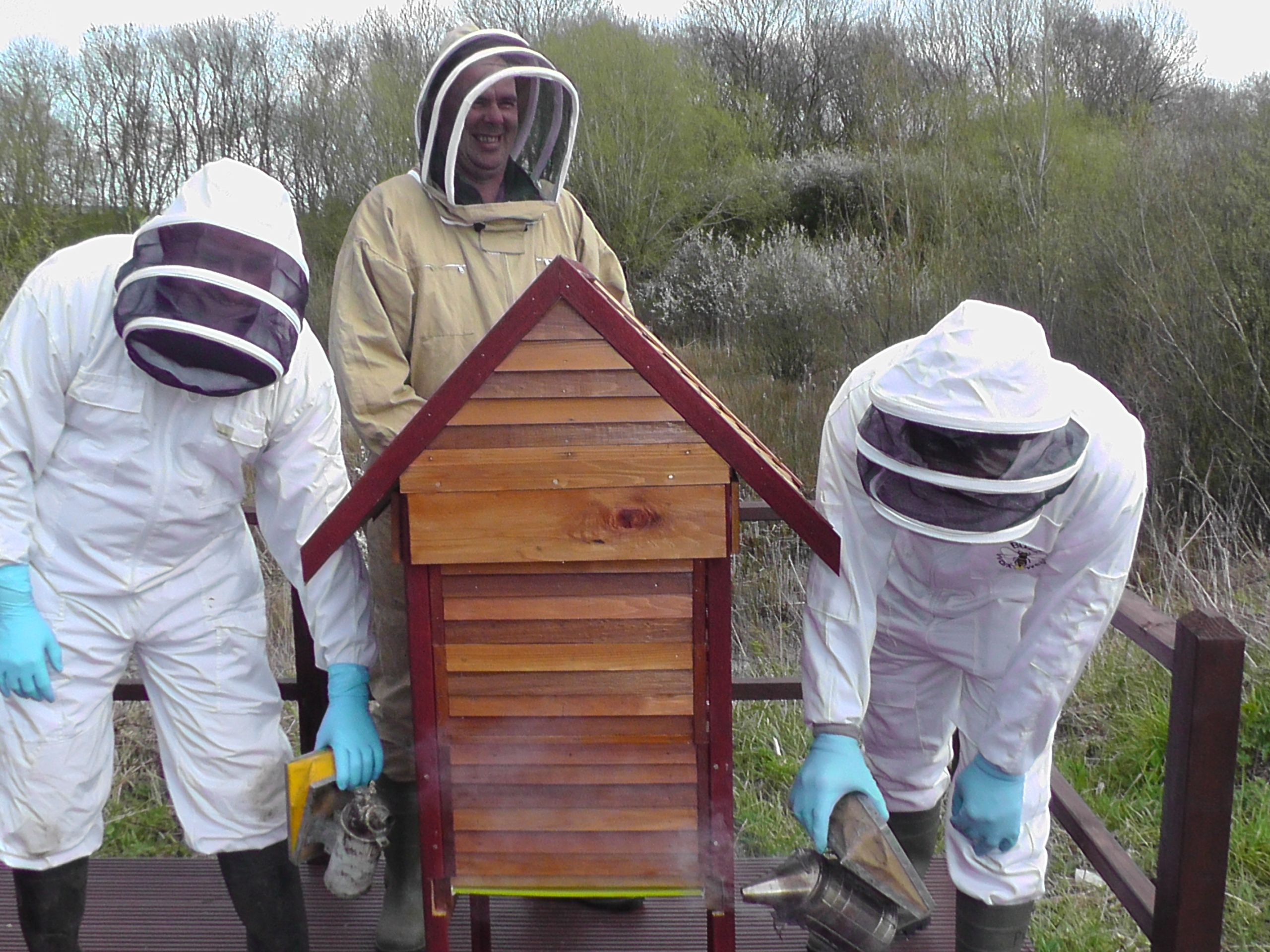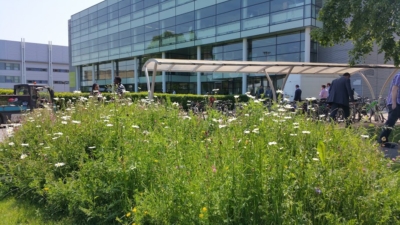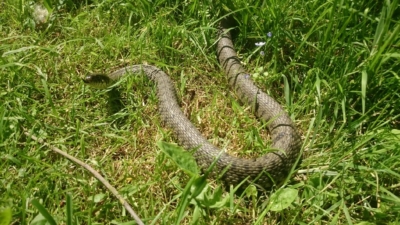Cranfield is going bee crazy!
24/06/2016

The Board for Energy and Environment (BEE for short) was established in 2011 as a subcommittee of the Executive to oversee energy and environmental strategy for the University. It turns out to have been aptly named as, five years later, not only do we have a very active programme of work to improve our environmental performance but bees feature very strongly.
 Much of the environmental performance delivery is organised by us in the Energy and Environment Team in Facilities. With responsibility for the grounds maintenance contract for the University it was natural that we would take opportunities to develop biodiversity. We have increased wildlife habitats on campus significantly, and now have 2 ha of land set aside as Biodiversity Action Areas (or BAASs). We are lucky on this campus to be a host to a variety of different habitats including the brook, woodland, scrubland and open grasslands.
Much of the environmental performance delivery is organised by us in the Energy and Environment Team in Facilities. With responsibility for the grounds maintenance contract for the University it was natural that we would take opportunities to develop biodiversity. We have increased wildlife habitats on campus significantly, and now have 2 ha of land set aside as Biodiversity Action Areas (or BAASs). We are lucky on this campus to be a host to a variety of different habitats including the brook, woodland, scrubland and open grasslands.
So what motivates us to create so much space for wildlife on campus? Firstly, we were inspired by Bee Orchids. These are beautiful flowers which are unique in the way they mimic bees with little furry bodies and a special ‘female bee’ scent. They grow sporadically on campus and bloom around June and July time. They also happen to be the county flower of Bedfordshire. We try our best to make sure they are protected on campus by leaving areas of grass uncut to allow them to grow naturally.
Secondly we were inspired by a University research project set up to determine the eco services provided by wild flower meadows in an urban environment – find out more about Urban BESS). One key beneficiary of wildflowers is the bee. Bees are a species vital to our survival as pollinators of our crops and flowers. With the loss of wild flowers, pressure of disease, use of neonicotinoid pesticides, and rapid urbanisation, it is no wonder the population has declined significantly over the last 100 years. Although our wildflowers provide a food source for bees, we have taken the initiative one step further and provided welcoming homes for bees. We now have three bee hives installed on campus which are managed by our grounds team, Nurture. Look out as there maybe Cranfield honey on sale soon!
 We celebrate our flora and fauna on a regular basis with campus ‘Lunchtime Biodiversity Walks’. Here, staff and students alike join us for wildlife spotting on campus. They have the opportunity to learn as well as to relax and take a break from their offices. We are also encouraging our staff and students to become ‘wild’ about biodiversity by taking part in a Wildlife Watch campaign asking everyone to submit photos. So far we have had submissions of grass snakes, geese, otter spraints and water shrews all spotted on our grounds. These sightings are added to our database which will build a bigger picture of what we have on campus. This will inform our biodiversity action plan and help shape our future grounds management on campus.
We celebrate our flora and fauna on a regular basis with campus ‘Lunchtime Biodiversity Walks’. Here, staff and students alike join us for wildlife spotting on campus. They have the opportunity to learn as well as to relax and take a break from their offices. We are also encouraging our staff and students to become ‘wild’ about biodiversity by taking part in a Wildlife Watch campaign asking everyone to submit photos. So far we have had submissions of grass snakes, geese, otter spraints and water shrews all spotted on our grounds. These sightings are added to our database which will build a bigger picture of what we have on campus. This will inform our biodiversity action plan and help shape our future grounds management on campus.
Looking to the future, we are working with our academics to link our activities to their research, developing the campus into a ‘living lab’. Our campus will become an exciting, living, breathing laboratory which will be used for ecological and environmental research. Please have a look at a presentation by students who worked with us this year reviewing options for living lab projects.
So if you are also wild about wildlife, or bee obsessed like us, why not join our biodiversity mailing list green@cranfield.ac.uk? We will send you regular updates our events and initiatives. We also work with the Wildlife Trust and Forest of Marston Vale to host volunteering events so you can get involved in hands-on conservation work. You can also follow us on Twitter. Don’t miss out!
Categories & Tags:
Leave a comment on this post:
You might also like…
Keren Tuv: My Cranfield experience studying Renewable Energy
Hello, my name is Keren, I am from London, UK, and I am studying Renewable Energy MSc. My journey to discovering Cranfield University began when I first decided to return to academia to pursue ...
3D Metal Manufacturing in space: A look into the future
David Rico Sierra, Research Fellow in Additive Manufacturing, was recently involved in an exciting project to manufacture parts using 3D printers in space. Here he reflects on his time working with Airbus in Toulouse… ...
A Legacy of Courage: From India to Britain, Three Generations Find Their Home
My story begins with my grandfather, who plucked up the courage to travel aboard at the age of 22 and start a new life in the UK. I don’t think he would have thought that ...
Cranfield to JLR: mastering mechatronics for a dream career
My name is Jerin Tom, and in 2023 I graduated from Cranfield with an MSc in Automotive Mechatronics. Originally from India, I've always been fascinated by the world of automobiles. Why Cranfield and the ...
Bringing the vision of advanced air mobility closer to reality
Experts at Cranfield University led by Professor Antonios Tsourdos, Head of the Autonomous and Cyber-Physical Systems Centre, are part of the Air Mobility Ecosystem Consortium (AMEC), which aims to demonstrate the commercial and operational ...
Using grey literature in your research: A short guide
As you research and write your thesis, you might come across, or be looking for, ‘grey literature’. This is quite simply material that is either unpublished, or published but not in a commercial form. Types ...






